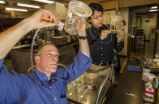(Press-News.org) Despite enormous investment in Iraq's health system in the 10 years since the US-led invasion, the health condition of Iraqis has deteriorated and will fail to improve unless more is done to improve living conditions. A review published today in the Journal of the Royal Society of Medicine concludes that continual investment in health services is crucial to elevate the health status of the Iraqi population, but that progress will be limited without improvements in housing, water and sanitation, electricity, transport, agriculture, education and employment.
The study was carried out by public health doctors from Imperial College London and Wayne State University, Detroit, who carried out several field visits to Iraq between 2011 and 2013. Professor Salman Rawaf, Imperial College London, who led the review, said: "There have been many attempts to come up with solutions that can help channel the resources needed to make Iraq's health system more effective. But our review showed that strategists and planners have a blind spot when it comes to the work that needs to be done to improve all aspects of living which play a vital role in positively affecting the health status of the people."
The authors found that housing conditions in Iraq are in a dire state for the majority of the population, with half a million people living in squatter settlements. While the government is building 25,000 housing units a year, the current need is for three million. The infrastructure for water and sanitation is too old and is a source of illness for many people, even in oil-rich Basra where the water supply is not suitable for human consumption. The national electricity supply is limited to 40%, forcing the public to purchase electricity privately or rely on noisy domestic power generators that increase CO2 emissions and noise pollution. Roads are in poor condition and road traffic injuries unacceptably high. The threat of roadside bombs and terrorist attacks in markets, cafés and places of worship is constant. Indeed terrorist attacks have intensified in 2014, prior to the 30 April general election, the third since the invasion of Iraq in 2003.
The authors also found that the Iraqi agricultural sector is not sufficient to cover the domestic market's need of essential food items and suffers desperately from lack of infrastructure and modern technology. The World Food Programme estimates that 22% of children under five years are stunted due to chronic malnutrition, despite the majority of Iraqi families receiving a monthly food supplement from the government. Literacy is relatively lower in Iraq than other countries in the region and the educational system, despite investment by the government, continues to be hindered by institutional corruption. Unemployment rates are unacceptably high.
Professor Rawaf said: "Living in Iraq today is not easy; nonetheless it is not all doom and gloom. The monumental investment to improve the health system, via national and international efforts, is very promising but needs significant and equal contribution in other aspects of life affecting health and quality of life."
He added: "Iraq's abundant natural and human resource base can be a valuable source for the revival of its economy and coherent social structure. Iraq's contribution to the regional development will be significant."
INFORMATION:
Notes to editors
Living conditions in Iraq: 10 years after the US-led invasion
(DOI: 10.1177/0141076814530684) by S Rawaf, S Hassounah, E Dubois, B Abdalrahman, M Raheem, H Jamil and A Majeed will be published by the Journal of the Royal Society of Medicine at 00:05hrs (UK time) on Friday 16 May 2014.
For further information or a copy of the paper please contact:
Rosalind Dewar
Media Office, Royal Society of Medicine
DL +44 (0) 1580 764713
M +44 (0) 7785 182732
media@rsm.ac.uk
The JRSM is the flagship journal of the Royal Society of Medicine and is published by SAGE. It has full editorial independence from the RSM. It has been published continuously since 1809. Its Editor is Dr Kamran Abbasi.
SAGE is a leading international publisher of journals, books, and electronic media for academic, educational, and professional markets. Since 1965, SAGE has helped inform and educate a global community of scholars, practitioners, researchers, and students spanning a wide range of subject areas including business, humanities, social sciences, and science, technology, and medicine. An independent company, SAGE has principal offices in Los Angeles, London, New Delhi, Singapore and Washington DC. http://www.sagepublications.com
Living conditions in Iraq must improve if investment in health system is to yield results
2014-05-16
ELSE PRESS RELEASES FROM THIS DATE:
Interrupted breathing during sleep affects brain neurons necessary to regulate heart rate
2014-05-16
Interrupted breathing during sleep affects brain neurons necessary to regulate heart rate
Sufferers of a common sleep-breathing disorder have diminished activity among neurons responsible for keeping heart rate low, reveals a new study published today [16 May] in The Journal of Physiology.
The research discovered that in obstructive sleep apnoea (OSA), neurons in the brainstem that control heart rate experience a blunting of their activity. The reduction of neuronal activity likely contributes to the increased heart rate, blood pressure and risk of adverse cardiovascular ...
Two large meals (breakfast and lunch) better than 6 small meals with same calories for controlling weight and blood sugar in people with type 2 diabetes
2014-05-16
Research published in Diabetologia (the journal of the European Association for the Study of Diabetes) suggests that two large meals (breakfast and lunch), rather than six small meals with the same total calories, are better for controlling weight and blood sugar in people with type 2 diabetes. The research is by Dr Hana Kahleová, Diabetes Centre, Institute for Clinical and Experimental Medicine, Prague, Czech Republic, and colleagues.
The study assessed 54 patients (29 men, 25 women) treated with oral diabetes drugs, aged 30–70 years, BMI 27–50 kg/m2 and HbA1c of 6–11.8% ...
Complex interactions may matter most for longevity
2014-05-16
PROVIDENCE, R.I. [Brown University] — If studying a single gene or a diet that might extend longevity is like searching for a fountain of youth, then a new study calls for looking at something more like the whole watershed. Brown University biologists who experimentally throttled three such factors in fruit flies found that lifespan depended more on interactions among the factors than on the factors themselves.
"I think the main lesson is that these interaction effects are as significant or important as the [single] effects, such as diet effects alone or genetic effect ...
How some trypanosomes cause sleeping sickness while others don't
2014-05-16
Trypanosome parasites transmitted by tsetse flies cause devastating diseases in humans and livestock. Different subspecies infect different hosts: Trypanosoma brucei brucei infects cattle but is non-infectious to humans, whereas T. b. gambiense and T. b. rhodesiense cause sleeping sickness in humans. A study published on May 15th in PLOS Pathogens reveals how humans can fight off some trypanosomes but not others.
Sam Alsford, from the London School of Hygiene and Tropical Medicine, UK, and colleagues, undertook a comprehensive search for genes that make T. b. brucei ...
Walking may have profound benefits for patients with kidney disease
2014-05-16
Washington, DC (May 15, 2014) — For individuals with kidney disease, walking may help prolong life and reduce the risk of needing dialysis or a kidney transplant. That's the conclusion of a study appearing in an upcoming issue of the Clinical Journal of the American Society of Nephrology (CJASN).
Physical inactivity is common among patients with chronic kidney disease (CKD). Che-Yi Chou MD, PhD, Chiz-Tzung Chang, PhD (China Medical University Hospital, in Taiwan) and their colleagues looked to see if an activity as simple as walking might provide benefits to patients. ...
New tool to grow cancer cells streamlines laboratory research
2014-05-16
VIDEO:
Georgetown Lombardi Comprehensive Cancer Center researcher Anna T. Riegel, PhD, discusses a new technique that allows the growth of both normal and cancer cells and keeps them alive indefinitely is...
Click here for more information.
WASHINGTON — A new technique that allows the growth of both normal and cancer cells and keeps them alive indefinitely is transforming and expediting basic cancer research, say investigators from Georgetown Lombardi Comprehensive Cancer Center. ...
New kidney allocation policy could improve the success of transplantations in the US
2014-05-16
Washington, DC (May 15, 2014) — A newly approved US policy regarding allocation of kidneys from deceased donors will likely improve patient and transplant survival, according to a study appearing in an upcoming issue of the Journal of the American Society of Nephrology (JASN). The true effects of the new policy are yet to be seen, however, and officials will evaluate its intended and unintended consequences on an ongoing basis.
In 2013, the Organ Procurement and Transplantation Network in the United States approved a new national deceased donor kidney allocation policy ...
Novel genetic mechanism protects plants from toxic zinc
2014-05-16
Zinc is essential for optimal plant growth and development but when high levels of the metal are present in the soil, it can become toxic to the plant. Consequently, plants need to trigger mechanisms capable of coping with that stress. Researchers from the Instituto Gulbenkian de Ciência (IGC) have now discovered a novel genetic mechanism that protects plants from toxic zinc levels. The research team, led by Paula Duque, identified a gene that produces a protein capable of sequestering zinc inside the cells of the root. In the presence of high levels of zinc, this gene ...
Tumor cells in the blood may indicate poor prognosis in early breast cancer
2014-05-15
Tumor cells in bone marrow of early breast cancer patients predict a higher risk of relapse as well as poorer survival, but bone marrow biopsy is an invasive and painful procedure. Now, it may be possible to identify tumor cells in a routine blood sample and use them as prognostic markers, according to a study published May 15 in the Journal of the National Cancer Institute.
To assess the prognostic value of circulating tumor cells (CTCs) in patients with early breast cancer, Brigitte Rack, M.D., of the Department of Gynecology and Obstetrics, Klinikum Innenstadt, ...
Older migraine sufferers may have more silent brain injury
2014-05-15
DALLAS, May 15, 2014 — Older migraine sufferers may be more likely to have silent brain injury, according to research published in the American Heart Association’s journal Stroke.
In a new study, people with a history of migraine headaches had double the odds of ischemic silent brain infarction compared to people who said they didn’t have migraines. Silent brain infarction is a brain injury likely caused by a blood clot interrupting blood flow to brain tissue. Sometimes called “silent strokes,” these injuries are symptomless and are a risk factor for future strokes.
Previous ...


